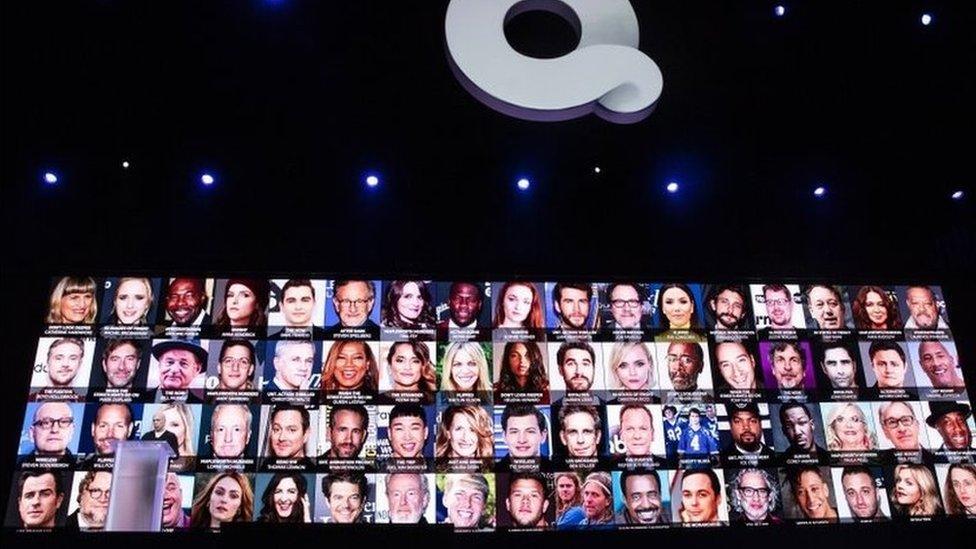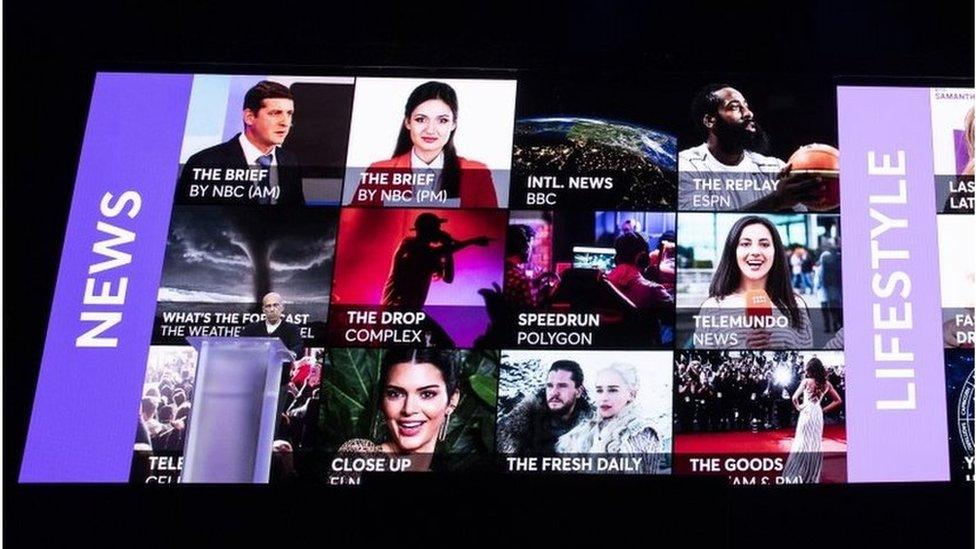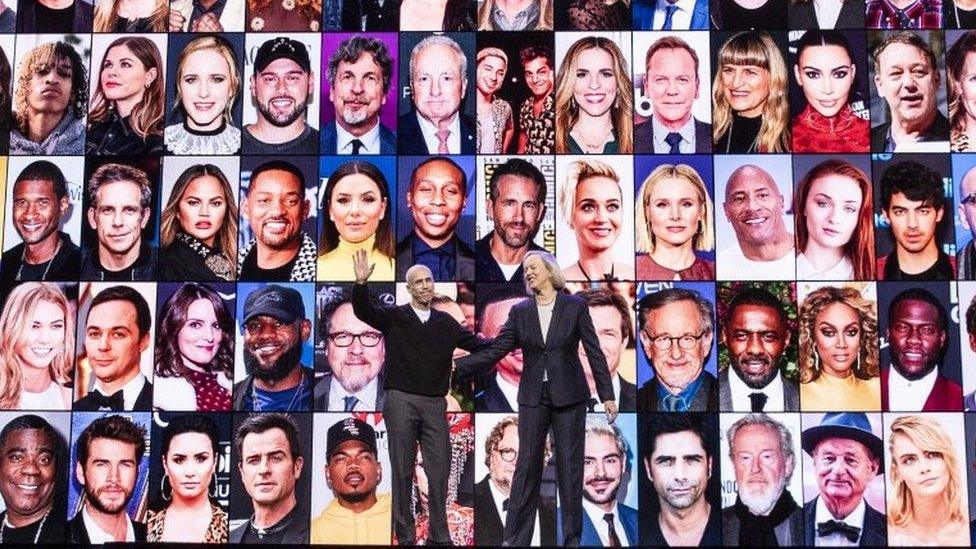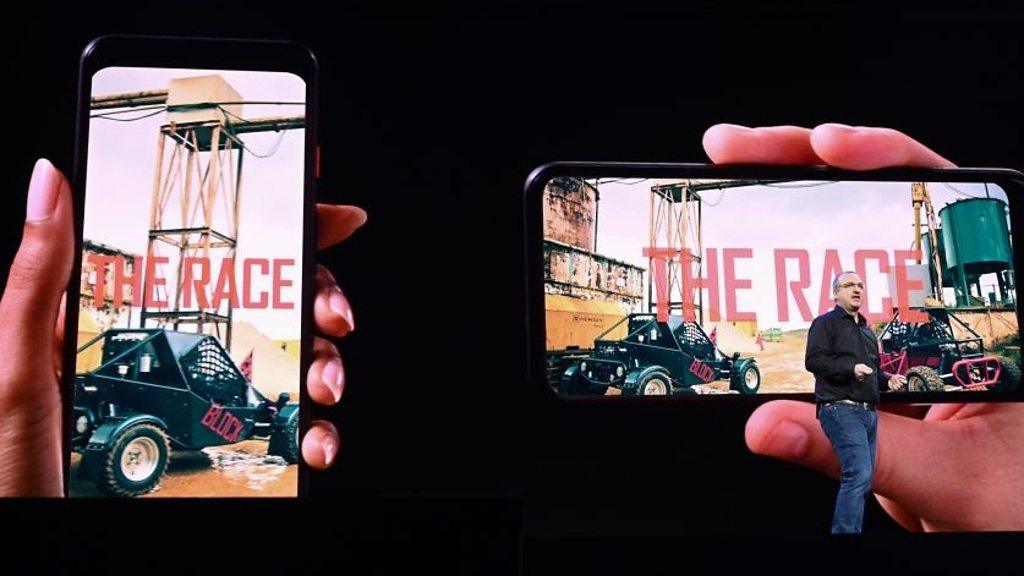Netflix rival will limit show times to 10 minutes
- Published
WATCH: Quibi aims to change how we watch shows on phones
A deep-pocketed new streaming service has revealed it will launch in the US on 6 April.
Quibi has raised $1bn (£763m) in funds and commissioned some of Hollywood's biggest names to make content for its mobile-only service. Each show will be 10 minutes or shorter.
The firm intends to charge $4.99 (£3.80) per month for basic access and $7.99 for an ad-free version.
But one industry-watcher questioned consumers' willingness to pay.
Quibi's chief executive Meg Whitman and founder Jeffrey Katzenberg announced the details of the service at the CES tech expo in Las Vegas.
She was previously the chief of eBay and Hewlett Packard Enterprise, while he produced some of Disney's best known animated movies before heading up Dreamworks Animation.
The stars involved in the new service include:
the directors Steven Spielberg, Sam Raimi and Guillermo del Toro
the models Chrissy Teigen and Tyra Banks
the actors Bill Murray, Idris Elba and Reese Witherspoon
In addition to entertainment, the service intends to screen bespoke news bulletins from NBC, BBC and Telemundo, among others.

Quibi has attracted some of the US entertainment industry's biggest names to make content for it
Much of the presentation was taken up showing off a feature called Turnstile, which allows viewers to keep the image full-screen, whether they hold their phone in landscape or portrait mode.
Show creators have framed their shots so that the action suits either aspect ratio, and in some cases have used the facility to reveal a different point-of-view.
For instance one show features a traditional perspective when the picture is widescreen, but shows a view of the protagonist's phone when held vertical.
After dark
Quibi which stands for "quick bites" is commissioning videos running from four to 10 minutes in length.
The services will include episodic series, and also movies - which will be divided up into chapters.
Ms Whitman announced that it had partnered with Steven Spielberg to create a horror series, After Dark, that can only be viewed after sunset. To do this, the app will check the user's location and the local time to check it is indeed dark where they are, Ms Whitman explained.
Off-stage, Ms Whitman told the BBC that Quibi had received more than a 100 pitches a week from filmmakers who wanted to use its Turnstile rotating video tech.

Quibi uses a special device to shoot some of the content for its shows
"There's a long history in this town of Hollywood, of technology enabling a new form of storytelling. And that's exactly what we're trying to do," she said.
This is not the first time streaming services have released interactive videos.
Netflix has offered a series of interactive programmes since 2017, most notably an episode of its sci-fi series Black Mirror.
But the feature remains a rarity on its platform.
One expert said Turnstile had promise but was unlikely to be a key selling point.
"Turning the screen to keep what is on the screen in frame is great, but it can't dictate the storyline and it is not enough to get someone to buy the content," said Dan Rayburn, principal analyst at Frost & Sullivan.
"And content is king."
Streaming competition
One of Quibi's biggest challenges will be persuading the public to pay for an additional streaming service.

Quibi will contain a range of factual content made for it by established news organisations
In 2019, several new players entered the video-streaming space including Apple TV Plus and Disney Plus. And there are others planning launches of their own in the US, including HBO Max and NBCUniversal's Peacock.
Netflix and Amazon Prime are also investing deeply in big-budget content to remain dominant.
But Quibi Mr Katzenberg told the BBC that he believed Quibi's main competition is other short-form video platforms such as YouTube, Snapchat and TikTok.
"If anything, we accelerate the experience of watching short form on your mobile device today," he added.

Quibi has yet to reveal when it will expand to other countries
Quibi said it would target viewers aged between 18 and 44 years old.
But most of that audience is accustomed to watching short-form videos for free.
"I think they are trying to change consumer habits too much," commented Mr Rayburn.
Quibi said it planned to release three hours of new premium content each day, excluding news content.
Its investors including traditional media outlets Fox, NBCUniversal and Disney.
- Published8 January 2020

- Published8 January 2020

- Published8 January 2020
